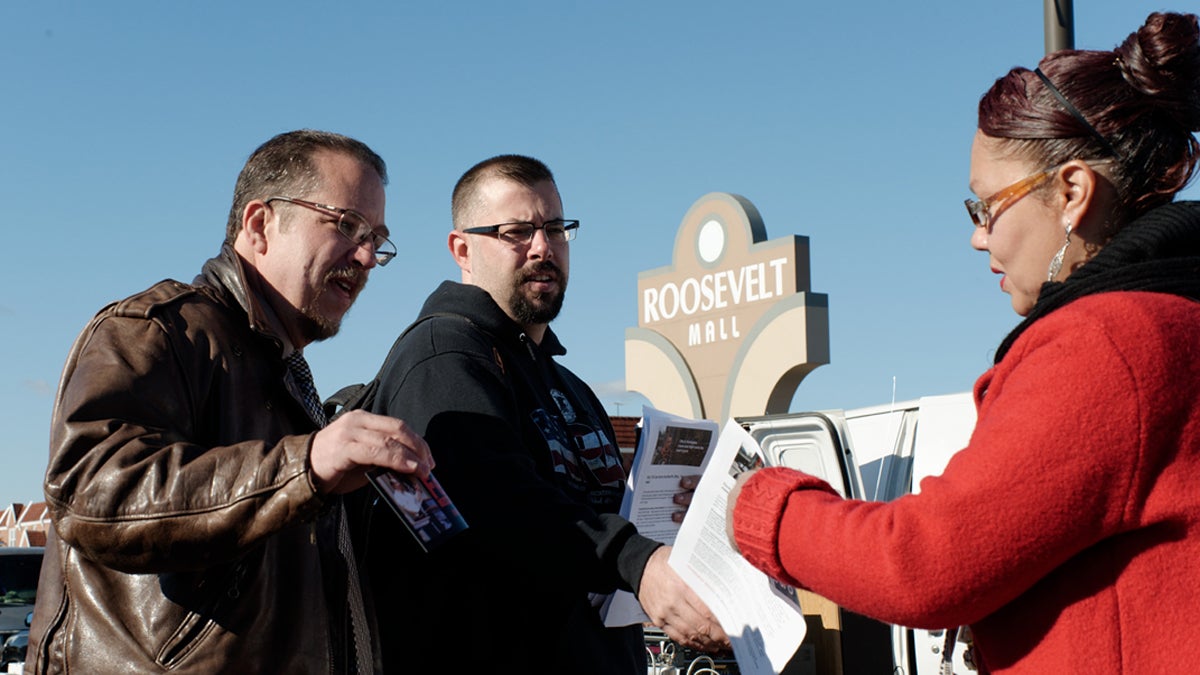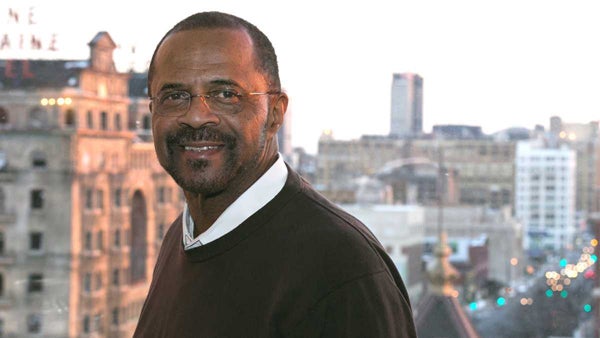Reforming sheriff property auctions fuels long-shot Republican challenger in Philadelphia
Listen
Ross Feinberg (left) Republican running for Register of Wills; and Chris Sawyer (center) the Republican candidate running for Philadelphia sheriff canvas together at the flea market outside Roosevelt Mall in Northeast Philadelphia (Bastiaan Slabbers/for NewsWorks)
It’s 10 a.m. on a Sunday. A coffee cup in one hand and a stack of campaign literature in the other, Chris Sawyer scans a busy, parking lot flea market outside Roosevelt Mall in Northeast Philadelphia. Time to introduce himself — and the office he’s hoping to fill — to potential voters.
Sawyer, 38, is the Republican candidate running for Philadelphia sheriff, one of three row offices on the ballot this year. It’s a post that many voters can’t explain or, in some cases, don’t even know exists.
“When you think of sheriff, you know what you think of? Andy Griffith,” Edward Boyle told Sawyer from behind a foldout table selling wrestling memorabilia and mugshots.
“Most people, that’s exactly what they imagine,” said Sawyer, an industrial systems engineer and anti-blight activist.
The life of a Philadelphia sheriff, though, is a far cry from thwarting moonshiners and bank robbers in Mayberry.
Part of the job is to transport prisoners and secure courtrooms during criminal proceedings. The other, less understood, part deals with real estate. Specifically, tax and mortgage delinquent real estate.
Five times a month, foreclosed properties are auctioned off to the highest bidder during sheriff sales. Roughly 10,000 are listed each year after owners fail to pay up.
Ideally, the sales create more tax producing properties and help collect lost revenue for the city in the form of unpaid property taxes and utilities.
This process is the focus of Sawyer’s grassroots campaign.
“It’s hard to describe whether or not it’s incompetence or it’s just sheer willful disregard for what you’re supposed to be doing as a sheriff when it comes to processing property,” said Sawyer.
Either way, he thinks the city is suffering as a result.
“The sheriff’s office really is the key to unlocking the city,” he said. “If you fix the real estate unit, make it more efficient, you participate directly in getting blighted, abandoned properties moved up into the market, then you can turn around a huge amount of the city.
“You’ll have developers coming in. You’ll also have nonprofits expanding. You’ll have a lot of economic activity driven off of that.”
Making it better every dayFrom his no-frills campaign office in Center City, the current sheriff, Democrat Jewell Williams, acknowledges that his office is a work in progress, but he also says its done a lot of good since he took over in 2012.
Williams, a former state representative, is particularly proud of the money his office has sent to the city’s coffers through sheriff sales.
 Philadelphia Sheriff Jewell Williams (Image courtesy of Williams campaign)”We went from $15 million to city of Philadelphia to $25 million. From $25 million to $45 million,” said Williams.
Philadelphia Sheriff Jewell Williams (Image courtesy of Williams campaign)”We went from $15 million to city of Philadelphia to $25 million. From $25 million to $45 million,” said Williams.
This year, he projects sheriff sales will net the city more than $60 million. For Williams, that total is a sign that he’s turning around an office that’s just now joining the 21st century and been a financial basket case in the past.
John Green, the sheriff before Williams, stepped down in 2011 after an audit found that his staff couldn’t account for millions collected from sheriff sales.
“We’ve now made it better and we’re making it better every day. So we went from a quiet storm to a calm. Every time we send more money to the city of Philadelphia, we’re resolving the issues that was happening in the past because we’re actually helping the city work,” said Williams.
Williams says he could do an even better job if he had more manpower on both ends of his operation.As of June 30, 2015, the end of that fiscal year, the office was budgeted for 311 employees, according to mayoral spokesperson Mark McDonald.
The office’s annual budget is roughly $18 million.
A couple months ago, Williams requested 30 more deputies. He says he needs them to help make transporting prisoners a more efficient process and to staff courtrooms.
McDonald says the request is still being evaluated, as it would “significantly” increase the office’s budget. The move would require City Council to pass an ordinance.
Williams would also like to hire 20 more people for his real estate unit, though he hasn’t made a formal request. There are currently as many independent contractors in the office. Without them, Williams argues his office would be underwater.
“The more sheriff sales we do, the more money the city makes or the city can get, but you’ve got to have bodies in order to move the work,” said Williams.
Sawyer argues that there’s plenty of money in the sheriff’s office right now to fix what needs fixing, that he wouldn’t need “a cent of taxpayer money.”
“I can just start slashing contracts and then there’s going to be people who are going to get what I call ‘no overtime’ — no overtime,” said Sawyer.
“If I can’t get rid of an employee who’s basically a drag on the agency, I can just turn around and say you’re never going to see overtime as long as I’m here. That stings. That’s almost as good as termination,” he said.
Slim oddsIt’s a policy Sawyer says, if elected, he’d hope to avoid having to use.
Sawyer’s chances on Tuesday are pretty slim. Democrats outnumber Republicans seven to one in Philadelphia. With so much settled during the May primary, voters also don’t typically turn out for general elections unless there’s a presidential race at the top of the ticket.
What’s more, Sawyer doesn’t have much money to reach voters. As of Thursday, he hadn’t filed campaign finance paperwork for the latest cycle. As of mid-September, he had no cash on hand.
As of Oct. 19, the end date for the last cycle before the general election, Williams had more than $25,348.37 at his disposal.
“I took statistics in college. I know what that involves,” said Sawyer of his chances.
“Most people are predicting that I don’t have a chance in hell. But there’s kind of a little bit of fun about that. Maybe this year, I might not make it. Four years from now, maybe I’ll have some more support. Anything can happen.
WHYY is your source for fact-based, in-depth journalism and information. As a nonprofit organization, we rely on financial support from readers like you. Please give today.





